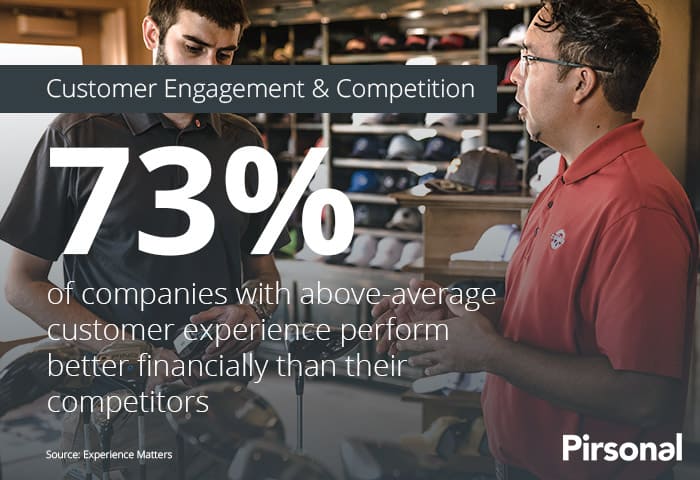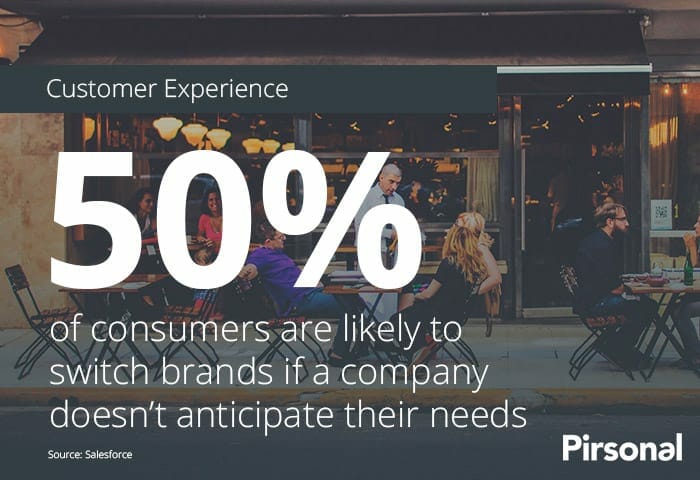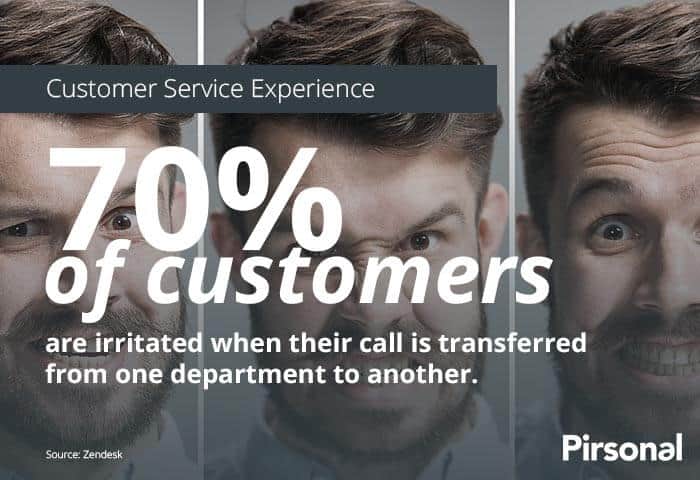Customer engagement plays a pivotal role in the growth of businesses.
Customer engagement is important as it can create loyalty, improve satisfaction, and increase revenue.
No business can say no to these benefits.
Engaging with customers goes beyond simply attracting new customers. It encompasses the ongoing interaction, involvement, and satisfaction of existing customers.
In this article, you’ll learn the profound impact of customer engagement on business growth, stats and strategies to effectively engage and retain customers.
Let’s delve into the key reasons why customer engagement is vital for businesses that aim to grow.
Leveraging Customer Engagement For Business Growth
Customer engagement plays a pivotal role in the growth of businesses, especially during uncertain times.
By proactively helping customers across the customer journey, companies can create a loyal customer base, improve customer satisfaction, and drive revenue growth.

In summary, when customers are engaged, they are more likely to:
1. Be loyal to the brand.
2. Make repeat purchases.
3. Recommend the brand to others.
4. Provide valuable feedback and insights.
5. Act as brand advocates.
On the other hand, low levels of customer engagement can result in:
1. Decreased customer retention.
2. Increased customer churn.
3. Negative word-of-mouth.
4. Missed opportunities for growth.
Given these implications, businesses must focus on customer engagement to thrive in today’s competitive landscape.
Let’s delve into the key reasons why customer engagement is vital for businesses that aim to grow.
Increased Customer Loyalty
Establishing a strong bond with customers fosters loyalty, encouraging them to choose your brand over competitors.
Customer engagement initiatives, such as personalized interactions, tailored offers, and proactive customer support, demonstrate that you value your customers and their needs.
This emotional connection builds trust and loyalty, leading to long-term relationships with your customers.
Improved Customer Satisfaction
When customers feel engaged and heard, they are more likely to be satisfied with their overall experience.
You can satisfy and go beyond customer expectations by asking for feedback, solving problems quickly, and improving your products or services according to their feedback.
This level of customer satisfaction not only strengthens customer loyalty but also generates positive word-of-mouth recommendations.
Enhanced Brand Advocacy To Reach Your Target Audience
Engaged customers become brand advocates, willingly promoting your products or services to their networks.
Through a superior customer experience, you improve your customer engagement metrics.

As a result, it becomes easier to impact your target audience.
Happy customers bring more happy customers.
It is that simple.
These loyal customers go beyond repeat purchases and actively endorse your brand through testimonials, social media posts, and online reviews.
Such advocacy not only amplifies your brand’s reach but also helps in attracting new customers, ultimately driving business growth.
Increased Customer Lifetime Value
Customer engagement strategies have a direct impact on customer lifetime value (CLV).
By nurturing relationships with your customers, you encourage repeat purchases and upselling opportunities.
For example, I’m a big fan of hotel marketing strategies.
It’s an industry that, in my view, faces many customer engagement challenges.
In the following video, I analyze and review the buying and onboarding process of a hotel.
I carefully observe how the hotel website interacts with me. I observe how my data is used to personalize my experience and to offer upgrades or additional services to increase revenue and engagement.
Considering that this is a well-known hotel chain with more resources than small and independent hotels, I’m surprised with my findings.
Studies show that engaged customers tend to spend more over their lifetime, contributing significantly to your revenue streams.
Moreover, these customers are less likely to churn, reducing customer acquisition costs and enhancing your bottom line.
Competitive Advantage
In a crowded marketplace, businesses need a competitive edge to stand out.
We’ve noticed this at Pirsonal. Back in the day, we were one of the few personalized video software companies in the market.
However, the market has rapidly evolved with new alternatives.
Many of these alternatives don’t have the same capabilities we or some of our main competitors offer, but they do distract potential buyers.
However, one of the key factors of success for Pirsonal has been the way we engage with customers.
We understand that most brands and agencies are not personalized video experts.
So by walking with them and providing expert help, we help them succeed.
Most clients appreciate our focus on people over technology, despite having a highly flexible, scalable, and secure platform.
This gives us a competitive edge.
Effective customer engagement provides that advantage.
By offering personalized experiences, exceptional customer service, and relevant content, you differentiate your brand from competitors.
This uniqueness not only attracts new customers but also solidifies your position in the market, making it harder for competitors to replicate your success.
Customer Engagement Statistics: The Numbers Don’t Lie
Now, let’s explore a wide range of customer engagement statistics, backed by reliable sources, to gain insights into this important aspect of business growth and strategy.
Customer Engagement and Revenue Growth
Engaged customers bring more benefits than the average customer. A study by Gallup found that they can represent a 23% premium in share of wallet, profitability, revenue, and relationship growth.
This highlights the significant impact of customer engagement on a company’s bottom line.
Customer engagement can become a growth engine within your organization.
Social Media and Customer Engagement
In the age of social media, customer engagement has taken on a new dimension.
Brands that actively engage with customers on social media platforms experience higher customer loyalty and satisfaction.
In fact, research by Hootsuite reveals that 71% of consumers who have had a positive social media experience with a brand are likely to recommend it to others.
Personalized Customer Engagement
Personalization is a key driver of customer engagement. According to a report by Epsilon, 80% of consumers are more likely to do business with a company that offers personalized experiences.
By tailoring interactions and communications to individual preferences, businesses can enhance customer engagement and build stronger connections.
For example, you can automatically create personalized videos to welcome new customers and provide them with their next steps.
Watch the following video to learn how a healthcare organization leverages personalized videos to onboard new customers, improve customer engagement and accelerate digital payments.
Mobile Customer Engagement
The rise of mobile devices has transformed customer engagement strategies, especially for B2C businesses.
With the majority of consumers using smartphones, businesses must optimize their engagement efforts for mobile platforms.
Research by Salesforce suggests that 68% of companies have integrated mobile marketing into their overall strategy, recognizing its potential to enhance customer engagement.
Customer Engagement and Trust
Building trust is crucial for long-term customer engagement.
Gallup reported that fully engaged customers represent a “23% premium in share of wallet, profitability, revenue and relationship growth compared with the average customer”.
By consistently delivering on promises, providing excellent customer service, and prioritizing transparency, businesses can foster trust and strengthen customer engagement.
Customer Engagement and Customer Lifetime Value (CLV)
Customer Lifetime Value (CLV) is a vital metric for businesses, representing the total revenue a customer generates over their lifetime.
Research by Harvard Business Review reveals that highly engaged customers have a 52% higher CLV compared to disengaged customers.
This emphasizes the long-term value of customer engagement and its impact on business sustainability.
Customer Engagement Strategies for Business Growth
Now that we understand the importance of customer engagement, let’s explore some effective strategies to foster engagement and drive business growth.
Creating Personalized Experiences
Tailoring your interactions and offerings to individual customer preferences can make a significant impact.
Leverage customer data and insights to deliver personalized experiences across various customer touchpoints.
Watch the following video to learn how to gather, analyze and use customer data to provide personalized customer interactions that boost customer engagement.
As you can see, personalization can range from targeted email campaigns and product recommendations to customized content and exclusive promotions.
When you demonstrate that you understand and value your customers, you encourage ongoing engagement and loyalty.
And, remember. Happy customers often have a network of potential customers.
As I shared in this article, customer engagement based on personalization is hard but there is no way you can skip it.
Your customers demand a one-to-one approach that takes them into account, for real.
Active Social Media Presence
Social media platforms provide an excellent opportunity to engage with your customers directly.
Introverts like me have a harder time here.
However, I know that this works.
Whenever I’ve made an effort to be active through specific social media channels like LinkedIn or YouTube through educational content, I’ve noticed that leads re-engage.
But also, clients appreciate it because we are providing content that helps them grow.
Maintain an active presence on relevant platforms and initiate conversations with your audience.
Respond to comments, questions, and feedback promptly and authentically.
Also, share valuable content, industry insights, and behind-the-scenes glimpses to keep your audience engaged and interested in your brand.
If this is a company-wide effort, choose the channels that are more relevant to your target audience.
If it is your professional effort, I would recommend choosing the platform and/or type of content you feel more comfortable with.
Proactive Customer Support
Efficient and responsive customer support is vital for customer engagement.
So, be available to address customer queries, concerns, and issues promptly.
Provide multiple support channels, such as live chat, phone support, and email, to cater to diverse customer preferences.

It depends on the product or service, the annual contract value (ACV), and the customer base.
For instance, complex and innovative products often perform better with phone and video call support. These channels also demand more budget.
Mainstream, more straightforward products or services do well with email and chat support.
At Pirsonal, we’ve noticed that Millennials (born 1980-1994) and Generation Z (born 1995-2012) prefer email and chat support. Also, customers need information right away.
However, older generations prefer video calls and emails.
Also, customers from Latinoamerica and Europe sometimes will reach out through WhatsApp.
Regardless, implementing self-service options, like comprehensive FAQs, community development, and knowledge bases, empowers customers to find solutions independently and reinforces engagement.
This is one of the many reasons why product teams and marketers should work together.
Surveys and Feedback Mechanisms
Regularly seek customer feedback through surveys, polls, and feedback forms.
I personally love talking to customers, either through video calls or by email.
I’ve found open-ended answers to be extremely insightful and on many occasions can see patterns in the answers provided by different customers.
When you do this, it demonstrates that you value their opinions and are committed to continuously improving your offerings.
But don’t leave it there.
Analyze the feedback received and take action to address areas of improvement.
Make involve customers and consumers in product development initiatives.
Sharing the changes made based on customer input enhances transparency and reinforces customer trust and engagement.
Exclusive Rewards and Customer Loyalty Programs
Incentivize customer engagement by offering exclusive rewards, discounts, or customer loyalty programs.
Also, encourage customers to participate in referral programs, leave reviews, or engage with your brand on social media.
You create a sense of exclusivity and appreciation by providing tangible benefits for their engagement.
This motivates customers to stay actively engaged with your brand.
Continuous Communication and Updates
Maintain regular communication with your customers to keep them informed and engaged.
Do this either manually, through product channels, or by leveraging marketing automation as it can help your organization be more customer-centric and efficient.
Share product updates, upcoming releases, and industry news through newsletters, email campaigns, and social media updates.
Keeping customers in the loop cultivates a sense of belonging and strengthens the bond between your brand and its customers.
FAQs
What is the definition of customer engagement?
Customer engagement refers to the level of interaction and involvement customers have with a brand or company, encompassing emotional connections and overall experiences.
Why is customer engagement important for business growth?
Customer engagement is crucial for business growth as it fosters customer loyalty, improves satisfaction, enhances brand advocacy, increases customer lifetime value, and provides a competitive advantage.
How can businesses effectively engage their customers?
Businesses can effectively engage customers by creating personalized experiences, maintaining an active social media presence, providing proactive customer support, seeking feedback, offering exclusive rewards and loyalty programs, and ensuring continuous communication and updates.
What role does customer satisfaction play in customer engagement?
Satisfied customers are more likely to actively engage with a brand, provide positive recommendations, and become loyal advocates. Customer satisfaction is a key component of customer engagement.
How can businesses measure customer engagement?
Customer engagement can be measured through various metrics, including customer satisfaction scores, net promoter scores (NPS), customer retention rates, repeat purchase rates, and social media engagement metrics.
Can customer engagement help businesses gain a competitive advantage?
Yes, effective customer engagement strategies differentiate a business from its competitors. By providing personalized experiences, exceptional customer service, and relevant content, businesses can gain a competitive advantage and attract and retain customers.
How does customer engagement impact business revenue?
Customer engagement has a direct correlation with revenue growth. Fully engaged customers tend to contribute a higher share of wallet, profitability, and revenue compared to the average customer.
Which channels are effective for customer engagement?
Personalized video platforms have emerged as effective channels for customer engagement. Active engagement through personalized video marketing can result in increased customer loyalty, satisfaction, and positive word-of-mouth.
Why is personalization important for customer engagement?
Offering personalized experiences makes customers more likely to do business with a company. Personalization enhances customer engagement by tailoring interactions and communications to individual preferences.
How does trust influence customer engagement?
Customers value trust and consider it a significant factor in their purchase decisions. Trustworthy brands tend to have higher levels of engagement. Building trust is essential for long-term customer engagement.
What is the relationship between customer engagement and Customer Lifetime Value (CLV)?
Highly engaged customers tend to have a significantly higher Customer Lifetime Value (CLV) compared to disengaged customers. This emphasizes the importance of customer engagement for long-term business success.
Final thoughts
Customer engagement is a critical driver of business growth in today’s competitive market.
By prioritizing meaningful interactions, personalized experiences, and proactive customer support, businesses can cultivate loyal customers, enhance customer satisfaction, and gain a competitive edge.
Utilizing effective customer engagement strategies not only promotes growth but also creates a strong foundation for long-term success.
Remember, building strong customer relationships is an ongoing process that requires consistent effort and personalized approaches.

